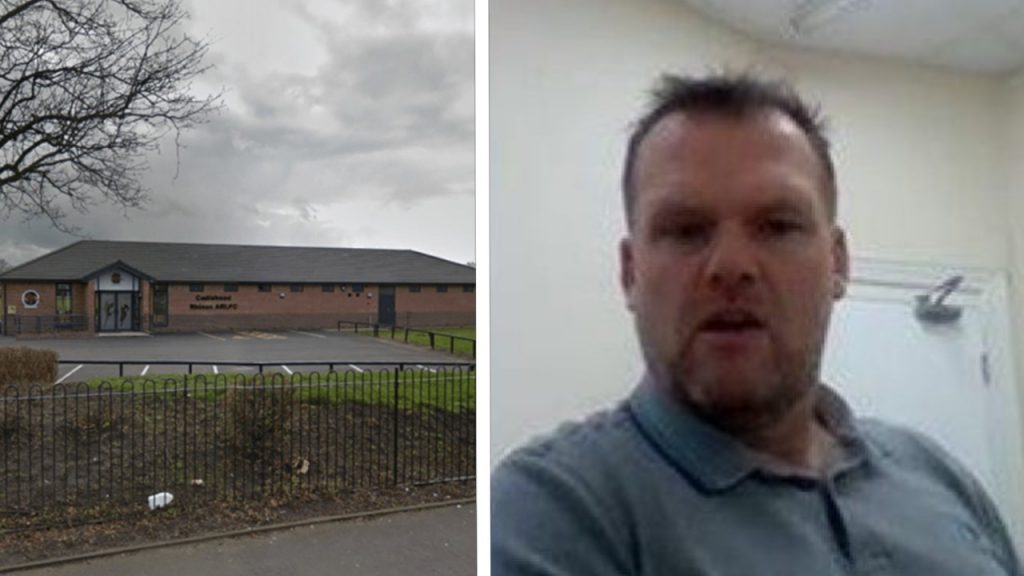
Paul Elliot, the club secretary at Cadishead Rhinos spoke about what it’s like to be an amateur club during COVID-19 and the impact the pandemic has had on their club, players and community.
Cadishead and all the other local Rugby League clubs have all had different challenges in making sure their clubs survives well during the pandemic, and across the two different lockdowns that were put in place.
A map showing where Salford’s amateur and professional Rugby League sides are based.
Speaking about his role Paul gave an insight on how the work he does at Cadishead has adapted during COVID-19 saying: “I think the role has changed a lot; I also took on the responsibility of being the COVID-19 officer during that period of time.”
He continued: “The biggest change was keeping up to date with the guidance which was being given to us by the RFL and ensuring the club complied with all that guidance.”
As well as being the club’s secretary Paul is also assistant coach with the Open Age first team and head coach of Cadishead’s u16’s side.
Paul’s extra role means helping his club adapt to the current time, he wanted to make sure his club were “able to deliver a safe place to continue rugby activities.”
“All of us at the community level are volunteers, the role has almost become close to being a full-time unpaid job.”
Before the second lockdown, Cadishead started to return to training: “We returned to training two weeks after clubs were permitted to so that gave us time to digest the guidance and make sure as a club we could deliver and uphold that.”

(Ethan Prescott)
“Initially it was a phased return, so we started back training in pods of six with social distancing and no contact whatsoever during that time.”
As the training further intensified and began to “look more like a normal training session” further rules and tactics to make sure the virus didn’t spread around the club were implemented, for example the use of “increased hygiene procedures”.
The RFL, the governing body for Rugby League in the UK, started a ‘pilot games’ scheme before the second lockdown began, Paul told me “we offered to take part in the pilot for the men’s open age team games, however because we was in a tier 3 area at the time they preferred not to involve us.”
He also praised the RFL and their outreach saying: “Personally I think the communications from the RFL have been very good, if anything there’s almost been an overload of information if I’m being honest.”
Anthony Atherton, the Social & Inclusion Manager at the RFL spoke about the pilot games in a statement sent by email saying: “The fixtures weren’t perfect, nobody could produce a perfect set of fixtures given the constraints in place. As we’ve all known for some time fixtures, where possible, needed to be played within the local authority area.”
He also had great things to say about his staff at the governing body as he said ” We couldn’t have done it without them.”
Speaking about the players and parents involved in the club, Paul mentioned the response of a return to training after the second lockdown: “we found overwhelmingly that players and parents have been happy to return”.
The Club wanted to make sure that the return was well received and wanted by all: “we did a survey monkey survey with our parents and layers to see if there was an appetite to return.”
According to the RFL website the next stage on the ‘return to play timeline’ is in January 2021 when possible preseason friendlies could be allowed to return.
Anthony spoke about the return to playing games after the first lockdown and how the clubs were a big part of why it worked well saying: “We got so far along in the action plan, to the point of playing games, because of the way the community clubs have followed the rules and procedures so diligently.
That’s not been easy but its really important to keep on track and get things running more normally in 2021. We can’t let our standards drop.”
Speaking on the return of the sport after the second lockdown Paul said: “I think there will be a complete break from now in the second lockdown through into December.”
“We’re now currently putting plans in place for when we are given the go ahead to return back to training in January.”
He also spoke of the hope of “social rugby” being allowed to return, and with it’s rising Women’s Touch Rugby team Cadishead would like to see a return of this type of rugby.
So, what is the game going to look like when it returns?
Anthony gave me a list of changes and adaptations that have already been made to the game during the pandemic, for example: “Arrival (changed and ready to train/play), temperature checking, not congregating, socially distancing outside of the session/game, regular equipment sanitisation, leaving and not socialising, one way systems, take away bars/cafes, no food”
From a club’s perspective Paul seems to think the adaptations will go on for a while, and some of the changes may even stay as part of the game’s new normal.
“I think in the interim it will be adapted, and I think there’s things that we’ve learned from the pandemic that we’ll probably carry forward as well.”
“In terms of rule changes at the community level the only thing that’s changed really is the inability to scrum, I think eventually once the restrictions are lifted, we’ll be able to return to that.”
Paul also spoke about the impact the pandemic has had on his players and other members of the club:
“I think it’s had a massive impact on both people’s morale and mental health throughout this period of time.”
Rugby League is an important part of a lot of people’s lives, and hopefully, the eventual return to the sport will raise the community’s spirits.
“We’ll never completely understand the extent of it until we look back on this period of time and the impact it’s had on the players.”
For information about any changes, updates and anything about Rugby League in the UK visit the RFL’s website.
For more information about Cadishead Rhinos look at their website.














Recent Comments